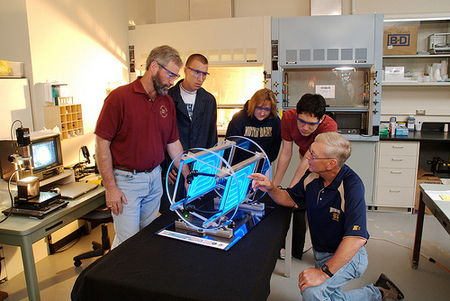
The QuarkNet Center at Notre Dame recently received an award of $8,000 from Notre Dame International for Masterclass Institutes Collaborating in the Americas (MICA). MICA, directed by Kenneth Cecire, national QuarkNet staff teacher, and Mitchell Wayne, professor of physics at the University of Notre Dame, will use the funding to create a partnership in particle physics education between Notre Dame and Pontifical Catholic University in Santiago, Chile.
The highlight of the partnership will be an international masterclass, which will bring high school students from Indiana and Chile together online. In the masterclass, the students become "particle physicists for a day" by performing measurements on real particle physics experiments with science mentors. Similar to typical international research collaborations, the students will join each other in a video conference at the end of each day to discuss and combine their results.
To prepare teachers and build the groundwork, Cecire and Notre Dame alumnus Patrick Mooney ’78, ’86 Ph.D., of Trinity School in South Bend will travel to Santiago conduct a workshop on the masterclass with the physicists at Pontifical Catholic University. The masterclass will be the beginning of a longer-term collaboration between the two universities in educating students and teachers about particle physics and finding ways to collaborate between the two physics departments.
The QuarkNet Center at Notre Dame was founded in 1999 by Notre Dame physicist Randal Ruchti. QuarkNet is an educational program sponsored by the National Science Foundation and the Department of Energy whose aim is to support science education in schools by establishing a nationwide network of science teachers. It provides opportunities for teachers to learn firsthand about cutting-edge physics research at universities and to establish mentoring relationships with physicists at universities and national laboratories. Through QuarkNet, high school students and teachers have played key roles in such high-profile experiments as the Large Hadron Collider in Geneva, Switzerland; Fermilab's Tevatron near Chicago; and future facilities such as the International Linear Collider.